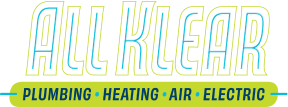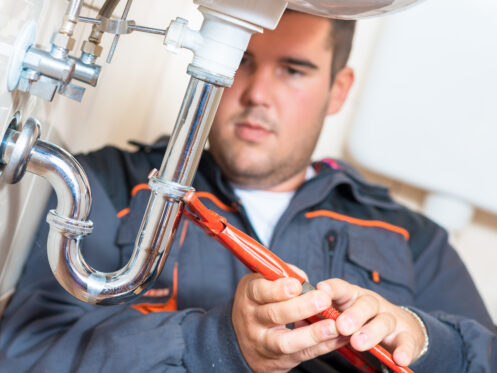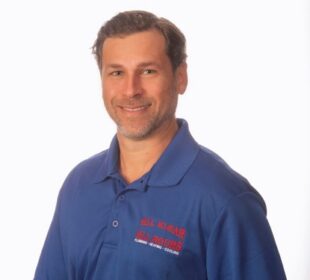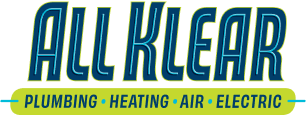The plumbing in your home is critical to your everyday life. So, it makes sense that you’d want to know as much about it as possible. That drives many homeowners to scour the internet and other places for plumbing information, tips, and tricks. Unfortunately, a handful of persistent plumbing myths constantly make the rounds. Here, we’ll debunk nine common myths so you won’t make any plumbing mistakes you’ll later regret.
1. It’s Safe to Ignore a Slow Faucet Drip
When one of your facets starts dripping, immediately finding and fixing the problem is essential. Some homeowners mistakenly believe it’s safe to ignore a dripping faucet. If you do this, you’re taking a considerable risk. A single drip per second will waste about 250 gallons of water each month. It’s enough to cause a substantial jump in your water bills. Plus, a steady, slow drip will wear away the finish of your sink. That’s irreversible, and it will turn an easy-to-fix problem into a costly repair.
2. Adding Weights to Your Toilet Tank Saves Water
Years ago, toilets used far more water per flush than needed. Until the 1990s, many Springfield, MO, homes had toilets that consumed between 5 and 7 gallons per flush (gpf). That’s when new efficiency regulations made 3.5 gpf toilets the norm. Today, most new toilets use a scant 1.28 gpf.
Unfortunately, many homeowners still cling to toilet water-saving measures that no longer apply. One is to add a brick or other solid object to your tank to save water on every flush. The idea is to displace some water and fool the toilet into turning off its fill valve early. Doing this with a modern low-flow toilet will only compromise the toilet’s flush performance. Newer toilets already minimize water use and don’t need any DIY hacks to help them.
3. Running Hot Water Lets You Safely Pour Grease Into Drains
Another common plumbing myth homeowners believe is that running hot water makes pouring grease down a drain safe. The logic behind that seems sound at first blush. If the grease can’t cool enough to solidify, it won’t clog your drains, right? The problem is that hot water doesn’t stop grease from solidifying; it only delays it.
It’s important to remember that your home has extremely long drainpipe runs. Residential hot water temperatures only keep grease from solidifying for a few yards past a sink drain. That’s just far enough to make clearing a clog impossible to do on your own. You should never pour grease down a drain. If you’re cleaning greasy pots and pans, use cold water. That forces the grease to solidify before it adheres to your pipes. Then, it will flow harmlessly from your plumbing and into the sewer lines.
4. Using Drain Cleaners Periodically Is a Good Preventative
If you browse the cleaning aisle at your local supermarket, you’ll find countless drain cleaning products. Every one of them claims that they won’t harm your pipes. As a result, some homeowners believe in using drain cleaners as a preventative measure against clogs. Doing so is a bad idea.
Most drain cleaning products contain caustic chemicals. They aim to try and dissolve clogs, so you don’t need a snake or an auger to break them up. If you use a drain cleaner a single time, it won’t likely harm your plumbing. Over time, however, drain cleaners will eat away at the interior of your drainpipes. Manual clog removal is safer and won’t do any lasting damage to your pipes.
5. Ice Will Sharpen Garbage Disposal Blades
A garbage disposal offers a handy and sanitary way to dispose of food waste. But for some reason, people mistakenly believe they require blade sharpening to keep working. To do this, people put large quantities of ice into their garbage disposal. There are two myths involved here. One is that garbage disposals have blades in the first place. They don’t. Garbage disposals have impellers that rely on centrifugal force to grind food. The second myth is that ice will sharpen the nonexistent blades and make them work better. All it will do is help you waste ice.
6. A Noisy Water Heater Signals a Pending Explosion
Next is another myth that seems to be an earlier-era holdover. It’s that a storage-tank water heater that starts making noise is about to explode. Early water heater designs indeed posed an explosion risk. It would happen when the tank exceeded its pressure capacity, causing a rupture. Today’s water heaters have pressure relief valves that make explosions unlikely. If you hear gurgling or rumbling coming from yours, it probably needs a flush and refill. You shouldn’t ignore those sounds, but you need not fear them.
7. Flushable Wipes Are Safe
It’s easy to take the manufacturer’s word for it when you buy everyday consumer products. So-called flushable wipes are an excellent example. They’re supposed to disintegrate when they sit in water, making them safe for your plumbing. If you use one or two of these occasionally, they probably won’t do any harm. However, flushable wipes take varied amounts of time to break down. That makes frequent use a bad idea. They’re one of the most common causes of clogged drains we see daily.
8. Toilet Tabs Containing Bleach Are Safe and Effective
Sanitizing your home’s toilets is a good habit to get into. All kinds of pathogens may thrive in a toilet that goes uncleaned for too long. However, it would be best if you didn’t try to take shortcuts. For example, you should resist using toilet tabs containing bleach. You may think they’re a great way to keep your toilet sanitary between cleanings. Unfortunately, they release bleach in your tank, which may eat away at plastic and rubber parts. Bleach will also erode the porcelain of the tank, shortening its life. Additionally, tiny trickles of diluted bleach passing through the bowl won’t have much sanitizing effect.
9. A Slow Drain Isn’t a Serious Problem
Finally, many homeowners think a slow drain is nothing more than an inconvenience. As long as the water eventually drains, everything’s OK, right? On the contrary, a sluggish drain is often a warning of a more significant problem. If the clog stems from a sewer line blockage, it won’t be long until the problem appears elsewhere. You could experience backed-up toilets or shower drains. Or, excess pressure created by the clog could lead to a cracked sewer pipe. That’s the kind of problem that can require excavation to fix.
Save Yourself the Trouble and Call a Plumber
If you have a plumbing question, don’t rely on questionable advice from the internet. Call the plumbing team at All Klear instead. We’ve spent over 15 years helping homeowners like you keep their plumbing in good working order. We also offer complete plumbing services, including maintenance, repairs, and water heater installation. We also provide repiping, gas lines, and water treatment. You can also call us for your home’s HVAC and electrical needs. We offer same-day services and free consultations and quotes. So, when you need plumbing services in Springfield, call All Klear immediately.




